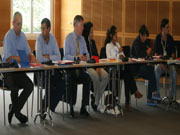UNI TAW wants to improve EWC representation

Affiliates from all over Europe met at UNI’s Global TAW Meeting in Nyon to exchange information on the current functioning of EWC’s in the TAW Sector and to develop future strategies how to improve the platforms already in existence and create new EWCs where there are presently gaps.
There are currently two European structures in place in Adecco and Ranstad. UNI intends to improve the functioning of these two platforms by using the new EWC Recast Directive as a means through which to renegotiate current agreements and structures. UNI’s European affiliates spoke of a need to improve access to information and rights of consultation in both platforms. UNI would like to see an upgrading of the current Adecco structure, the Platform for Adecco Communication in Europe (PACE) created in 1999, to a genuine EWC. Problems with Ranstad’s present structure the Randstad European Platform, were also identified including the need to renegotiate the current agreement in-line with the improvements brought in with the recast directive. UNI’s long-term strategy also includes identifying other MNCs in the TAW sector within which to potentially build EWCs.
Rachel Owens, UNI europa’s policy officer for TAW, spoke about the joint UNI europa/EMF initiative to launch a European Trade Union Implementation Guide for the EWC recast directive. UNI europa is hoping to have the support of all the main European Trade Union federations and will present its proposal to the Management Committee in October.
Improvement and development of EWCs in the TAW sector was noted as being particularly important given the negative affects of the economic crisis on the sector in terms of job losses, restructuring and job stability. UNI europa believes that strong EWCs with a high level of trade union representatives is one of the most effective strategies for combating the often harmful effects of MNC restructuring. UNI affiliates also detailed the negative effects of redundancies on union strength in the sector although, some European unions had been able to increase membership in TAWs by offering employment benefits they had successfully achieved through effective collective bargaining processes.

